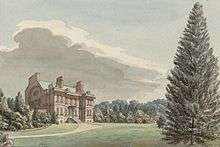William Emes
William Emes (1729 or 1730–13 March 1803) was an English landscape gardener.
Biography
Details of his early life are not known but in 1756 he was appointed head gardener to Sir Nathaniel Curzon at Kedleston Hall, Derbyshire. He left this post in 1760 when Robert Adam was given responsibility for the entire management of the grounds. During his time at Kedleston he had started to alter the earlier formal nature of the park and had constructed the upper lake. Also during this time he married Mary Innocent, his servant and the daughter of a tailor. Together they had five sons and three daughters.[1] His son John Emes who was born in 1762 was a successful engraver and silversmith.[2]
After leaving Kedleston he moved to live in Bowbridge House, (Not Bowbridge Fields farm as previously thought) Mackworth. This was later the home of Edward Darwin (son of Erasamus Darwin who was William Emes friend through the Lunar Society) where he developed his practice as a landscape designer, which was concentrated mainly in the Midlands and in north Wales. His style was similar to that of Lancelot 'Capability' Brown. At Eaton Hall, Cheshire, Emes was called in to replace Brown by Lord Grosvenor.[1] He sometimes furnished a plan and then left the client to undertake the work. On other occasions he would supervise the work for many years, such as the gardens at Chirk Castle and at Erddig where his involvement continued for 25 years.[3] Emes also designed a few minor buildings.[1]

The main features of his designs were trees and water.[3] Characteristic designs included serpentine lakes with their ends concealed in woodland, single trees and clumps of trees in parkland with tree belts round the boundary. He created flower gardens adjacent to the house at Sandon Hall, anticipating the later work of Humphry Repton.[1]
His wife died in 1789 and Emes then moved to Hampshire taking a lease of Elvetham Park from Sir Henry Gough-Calthorpe. Here he took commissions in the south of England, sometimes in partnership with John Webb, formerly his foreman. He later moved to London where he died at Vicarage House, St Giles Cripplegate, the home of his daughter, Sarah. He was buried at St Giles Cripplegate.[1]
Designs
Buildings
- Lodge at Attingham Hall, Shropshire[1]
- Greenhouse at Penrice Castle, Glamorgan[1]
Gardens
In whole or in part:
Cambridgeshire
Cheshire
- Tatton Hall (1768)[3]
- Crewe Hall (1769)[3]
- Oulton Hall (1770)[3]
- Peover Hall[3]
- Eaton Hall[1]
- Cholmondeley Hall (1777)[3]
- Arley Hall (c.1760 and then 1787)
Derbyshire
- Kedleston (1756–1760)[1]
- Calke Abbey (1776)[4]
- Markeaton Hall
- Shipley Hall[5]
- Darley Park
- Radbourne Hall (1790)
- Locko Hall (1792)[4]
Gloucestershire
- Daylesford House[4]
- Dodington House (1793)[4]
- Fairford Park (1783–87)
Greater Manchester
- Platt Hall (1768)[3][6]
- Heaton Hall (1770)[3][7]
Hampshire
Lancashire
- Claughton Hall, Garstang
Lincolnshire
Norfolk
Nottinghamshire
- Kirklington Hall (1774) [8]
- Carlton Hall, Carlton in Lindrick (1783) [9]
Shropshire
- Walcot Park (c. 1774)[10]
- Halston Hall (1770s)[11]
- Aston Hall (near Oswestry) (1780)[12]
- Badger Hall and Dingle (c. 1780)[4][13][14]
- Dudmaston Hall[4][15]
- Millichope Park[4]
- Oakley Park[4]
- Hawkstone Park (lake)[1][16]
- Cheswardine Hall,[17] Chipnall [18]
Staffordshire
- Ingestre[3]
- Sandon (1767)[3]
- Keele Hall (1768–1770)[3]
- Oakedge (1771)[3]
- Beaudesert House[3]
- Cuffnell[3]
- Statfold (1777)[3]
- Sandon Hall (1781–1782)[1]
- Etruria Hall
- Betley Court
Wiltshire
- Chute[3]
- Bowood House[4]
Yorkshire
- Cave Castle (1787–1791)[4]
Wales
- Chirk Castle, Denbighshire (1764–75)[1][19]
- Erddig, Denbighshire (1768–89)[1][20]
- Llanrhaeadr Hall, Denbighshire (1771)[4][21]
- Hawarden Old Rectory, Flintshire (1774)[3][22]
- Gregynog, Montgomeryshire (1774)[4]
- Powis Castle, Montgomeryshire[4]
- Penrice Castle, Glamorganshire [23]
- Margam Park, Glamorganshire[4]
- Rhiwlas, Montgomeryshire[4]
References
Notes
- Goodway, K "Emes, William (1729/30–1803)", rev., Oxford Dictionary of National Biography, Oxford University Press, 2004, accessed 30 January 2007
- Anne Pimlott Baker, 'Emes, John (1762–1808)', Oxford Dictionary of National Biography, Oxford University Press, 2004 accessed 15 September 2013
- Bostock, T. (June 2005). "Oulton's Historic park and garden". Cheshire History. 44: 48–61. ISSN 0141-8696.
- Places associated with Emes, accessed 30 January 2007
- Bygone Derbyshire The History of Shipley Country Park – Miner's dial is a pointer...
- Hartwell, Hyde & Pevsner 2004, p. 474.
- Hartwell, Hyde & Pevsner 2004, p. 402.
- Kirklington_hall retrieved 6 March 2018
- Carlton Hall retrieved 6 March 2018
- Newman & Pevsner 2006, p. 672.
- Newman & Pevsner 2006, p. 280.
- Newman & Pevsner 2006, p. 124.
- Newman & Pevsner 2006, pp. 131–132.
- Victoria County History, Shropshire, vol. 10, p.213.
- Newman & Pevsner 2006, p. 255.
- Newman & Pevsner 2006, p. 293.
- Cheswardine Hall
- Newman & Pevsner 2006, p. 196.
- Hubbard 1986, p. 127.
- Hubbard 1986, p. 163.
- Hubbard 1986, p. 232.
- Hubbard 1986, p. 369.
- Penrice Castle
Bibliography
- Hartwell, Clare; Hyde, Matthew; Pevsner, Nikolaus (2004). The Buildings of England: Lancashire: Manchester and the South-East. New Haven & London: Yale University Press. ISBN 0-300-10583-5.CS1 maint: ref=harv (link)
- Hubbard, Edward (1986). The Buildings of Wales: Clwyd. London: Penguin. ISBN 0-14-071052-3.CS1 maint: ref=harv (link)
- Newman, John; Pevsner, Nikolaus (2006). The Buildings of England: Shropshire. New Haven & London: Yale University Press. ISBN 0-300-12083-4.CS1 maint: ref=harv (link)
Further reading
- Goodway, K. (1996). "William Emes and the Flower Garden at Sandon, Staffordshire". Garden History. Garden History, Vol. 24, No. 1. 24:1 (Summer): 24–29. doi:10.2307/1587094. JSTOR 1587094.